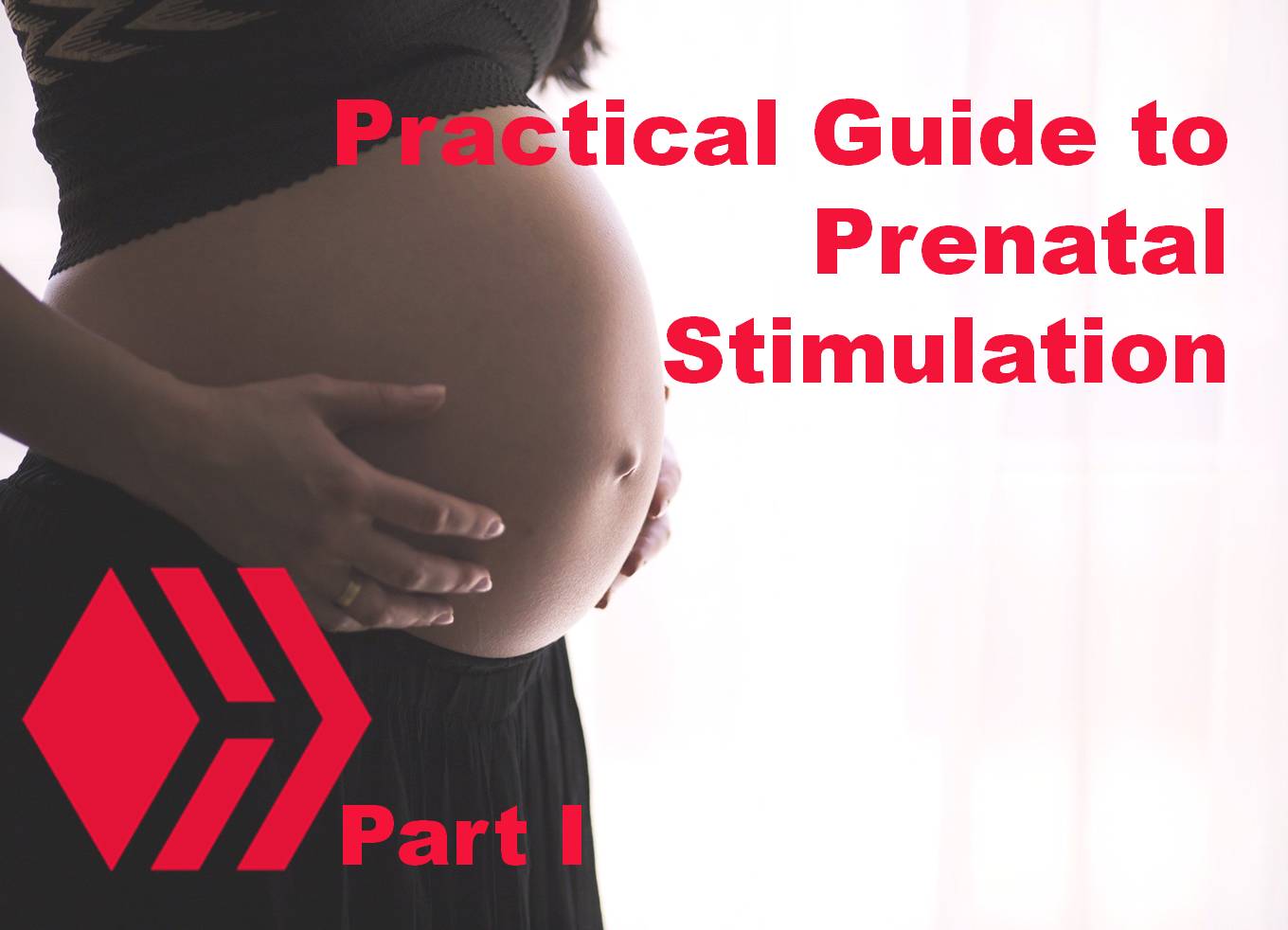
Source
La versión en español se encuentra debajo
Hello #Hivers, warm greetings to all. In this post I want to share some super interesting material on a topic that has become trendy lately, but about which, in some respects, little is still known: Prenatal Stimulation.
I confess that this became a central topic in my life from the moment I knew I was pregnant, because I was anxious to know the ways in which I could provide the best development opportunities for my baby from the very first moment, especially through art.
To talk about this topic there are some basic things we should know:.
So far there is no research that scientifically demonstrates that prenatal stimulation (applied directly to the fetus) produces cognitive advantages in children who were stimulated, with respect to others who were not.
The senses of the fetus begin to function from approximately the fifth month of gestation, so that, with greater or lesser maturity, the fetus is able to perceive light, sound, flavors (through the substances that flow through the umbilical cord and connect it to its mother) and some tactile sensations.
There is a close physiological and cerebral relationship between the pregnant body and the fetus, and the latter, known as the "neural mega-network", is a mechanism that coordinates, correlates and in many cases synchronizes the brain functions of mother and baby. It is here where emotions come into play, and it is also where we will lay the foundations of this STIMULATION GUIDE.

We will focus on Mom
If we start from the fact that the baby in formation is connected both physiologically and neurologically with its mother, it is completely correct to think that as long as mom is well, baby will be well (it also applies to the postpartum period). Well-being is understood as a series of satisfied physical, psychological and emotional needs.
There is a well-known phrase about this: "The baby feels everything the mother feels ", and this is scientifically proven. Therefore, the first and most important stimulus in fetal development is the mother's tranquility and well-being. The emotional containment and stability that begins in the womb will allow the child to optimally develop his or her cognitive abilities, emotional and physical intelligence, security, and an endless number of other benefits that will condition -partially- his or her possibilities of being happy, facing and solving problems and succeeding in his or her life goals.
If, on the contrary, during gestation the mother feels STRESS and ANXIETY for long periods of time, this can have a negative impact on the neurological development and general health of her unborn child, due to prolonged exposure to states of brain alteration.
Biochemically speaking:
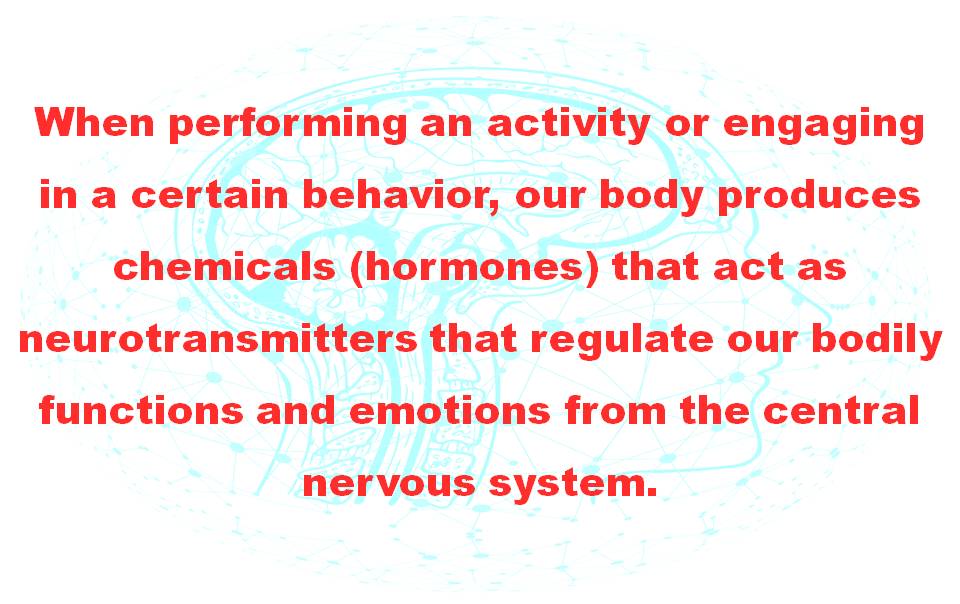
Thus, for example:
Serotonin is related to the feeling of happiness, while also playing a role of great importance in the digestive process and in the regulation of the sleep cycle (low serotonin levels are biologically associated with depression).
Dopamine is the hormone that produces feelings of pleasure and also regulates memory and the cognitive processes of learning and problem solving.
Adrenaline keeps us alert and sensitive to other stimuli, acts as a survival mechanism and also regulates breathing rate and blood pressure.
Glutamate is an important processor of motor, sensory, cognitive and emotional information.
And these are just a few of the many types of neurotransmitters that influence the functioning of our body and mind.
Now let's put the puzzle together....
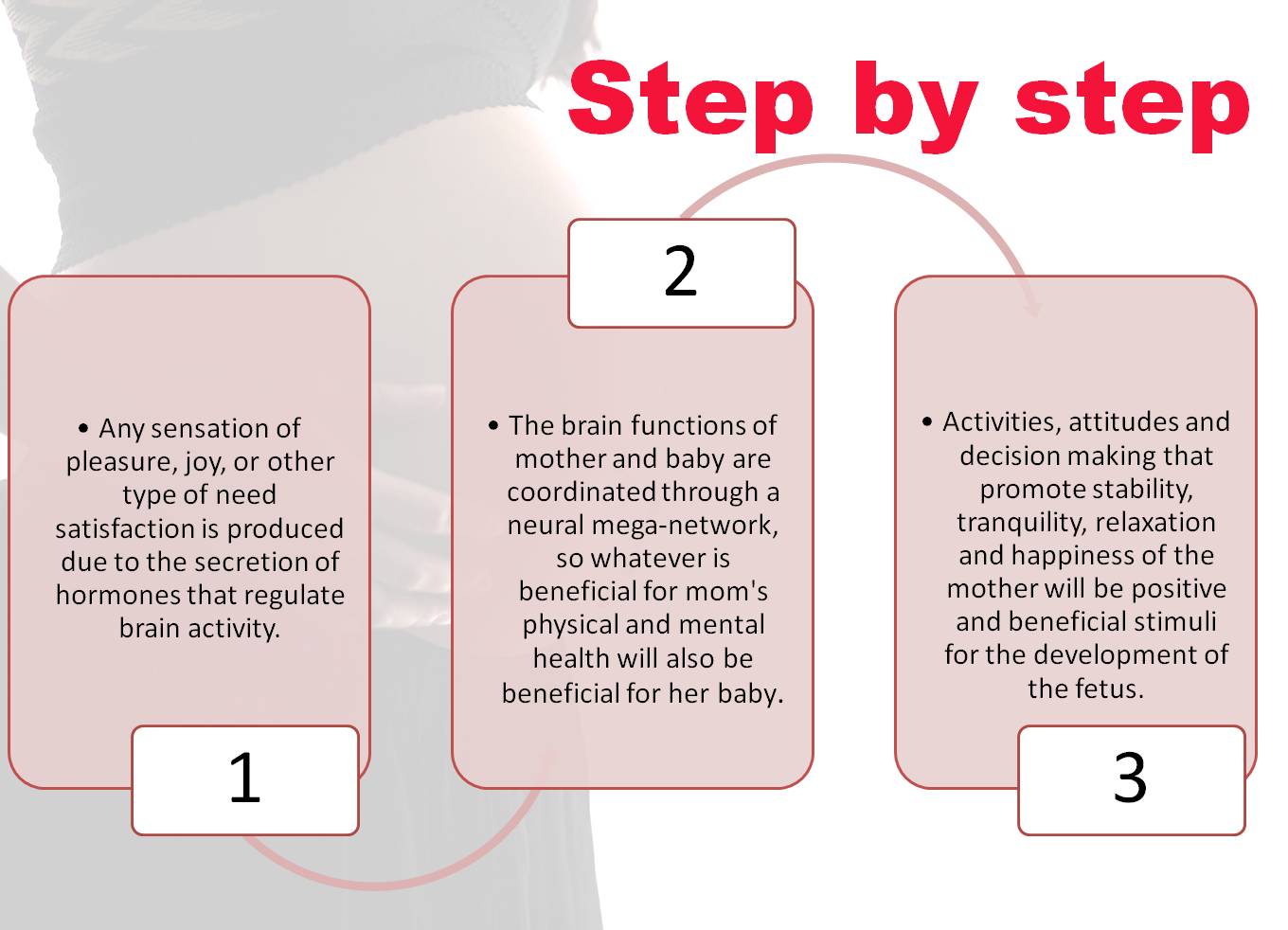
Now it's much clearer isn't it? 😃
Let's get to practice!
💓
Before we sign up for the exercises, it is important to keep in mind and practice these principles throughout your pregnancy:
1) Accept your emotions:
Practicing acceptance of our emotions is a key point not only in pregnancy, it should be considered a principle of life, but we have mistakenly learned that certain feelings and/or emotions are "bad" and that we should refuse to feel them. Anger, rage, sadness and fear are some of them; but repressing our emotions is counterproductive for the mechanisms with which our psyche works.
Are you familiar with the phrase: "don't cry, it hurts the baby "?
Well, holding back and not draining our frustration is not very good for him/her either; and if we add to that how guilty we feel for "hurting" our child by having these feelings, we have the perfect combination to activate stress and anxiety, which can be detrimental to development.
So, stay consciously connected with your body and its sensations, with your emotions and feelings; live them, and give yourself time and space to recognize in which situations it is helpful to feel them and in which situations it is not. Then you can work on it without guilt.
2) Make time for your interests:
Anything that excites you, excites you, gives you peace or empowers you, deserves your time, give it to them. Here I could list a list of things to do (surround yourself with nature, continue working, go out with friends, undertake a project...), but there are so many possibilities that each one of us should create our own list of interests, carry it out and surround our baby with that energy that moves and motivates us.
3) Connect with other women:
The support and understanding you will receive from other mothers, friends and women in your family is like no other, they will be your mirror and refuge. Create your female support network and practice sisterhood.
Thank you for reading me!
In the next post I show you a series of activities for mom's physical well-being, her relaxation and body and creative expression; and then, a series of sensory stimuli for the baby. Kisses and love to all.
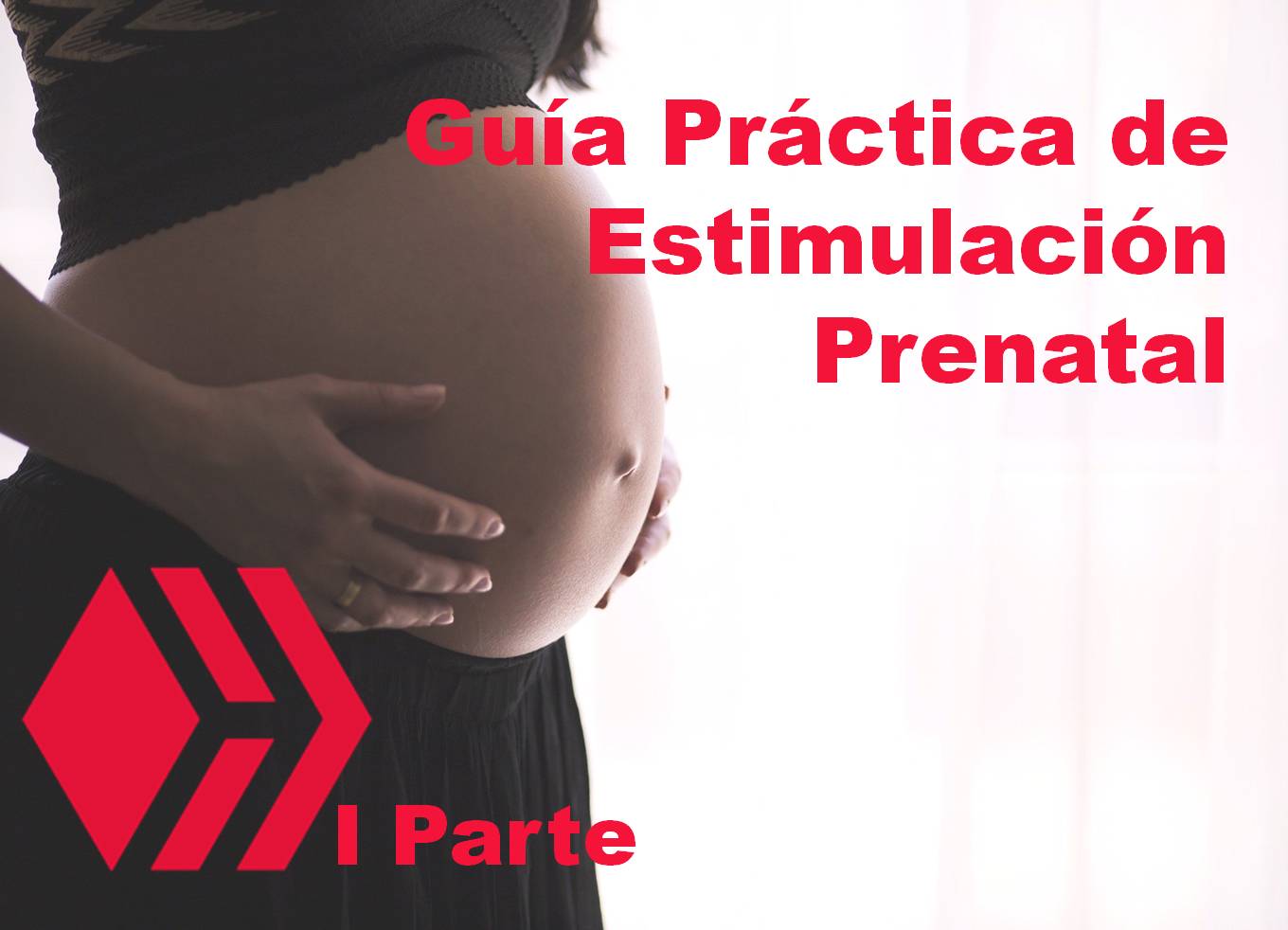
Fuente
Versión en español
Hola #Hivers, saludos afectuosos para todos. En esta entrada quiero compartir un material súper interesante sobre un tema que últimamente se ha vuelto tendencia, pero del que, en algunos aspectos, aún se sabe poco: La Estimulación Prenatal.
Confieso que este se volvió un tema central en mi vida desde el momento en el que supe que estaba embarazada, pues me inquietaba conocer las formas en las que pudiera brindarle las mejores oportunidades de desarrollo a mi bebé desde el primer momento, especialmente a través del arte.
Para hablar de este tema hay algunas cosas básicas que debemos saber:
Hasta el momento no hay una investigación que demuestre científicamente que la estimulación prenatal (aplicada directamente al feto) produce ventajas cognitivas en los niños que fueron estimulados, respecto a otros que no lo fueron.
Los sentidos del feto entran en funcionamiento desde el quinto mes de gestación aproximadamente, por lo que, con mayor o menor madurez, el mismo el capaz de percibir la luz, el sonido, los sabores (a través de las sustancias que fluyen por el cordón umbilical y que lo conectan con su madre) y algunas sensaciones táctiles.
Entre el cuerpo gestante y el feto existe una estrecha relación tanto fisiológica como cerebral, y esta última, conocida como "Mega-red neuronal", es un mecanismo que coordina, correlaciona y en muchos casos sincroniza las funciones cerebrales de mamá y bebé. Es aquí donde entran en juego las emociones, y es también donde pondremos las bases de esta GUÍA DE ESTIMULACIÓN.

Nos centraremos en Mamá
Si partimos del hecho de que el bebé en formación está conectado tanto fisiológica como neurológicamente con su madre, es completamente acertado pensar que entre tanto mamá esté bien, bebé estará bien (también aplica para el postparto). Entendiendo el bienestar como una serie de necesidades satisfechas, de orden físico, psicológico y emocional.
Sobre esto hay una frase muy conocida: "El bebé siente todo lo que siente la madre", y esto sí está científicamente comprobado. Por ello, el primer y más importante estímulo en el desarrollo fetal es la tranquilidad y bienestar de la madre. La contención y estabilidad emocional que comienza desde el vientre, a futuro permitirá al niño o niña desarrollar de manera óptima sus habilidades cognitivas, inteligencia emocional y física, seguridad, y un sin fin de otros beneficios que condicionarán —parcialmente— sus posibilidades de ser feliz, afrontar y resolver problemas y tener éxito en sus objetivos de vida.
Si por el contrario durante la gestación la madre siente ESTRÉS y ANSIEDAD por largos periodos de tiempo, esto puede repercutir de forma negativa en el desarrollo neurológico y en la salud general de su bebé en formación, debido a la exposición prolongada a estados de alteración cerebral.
Bioquímicamente hablando:
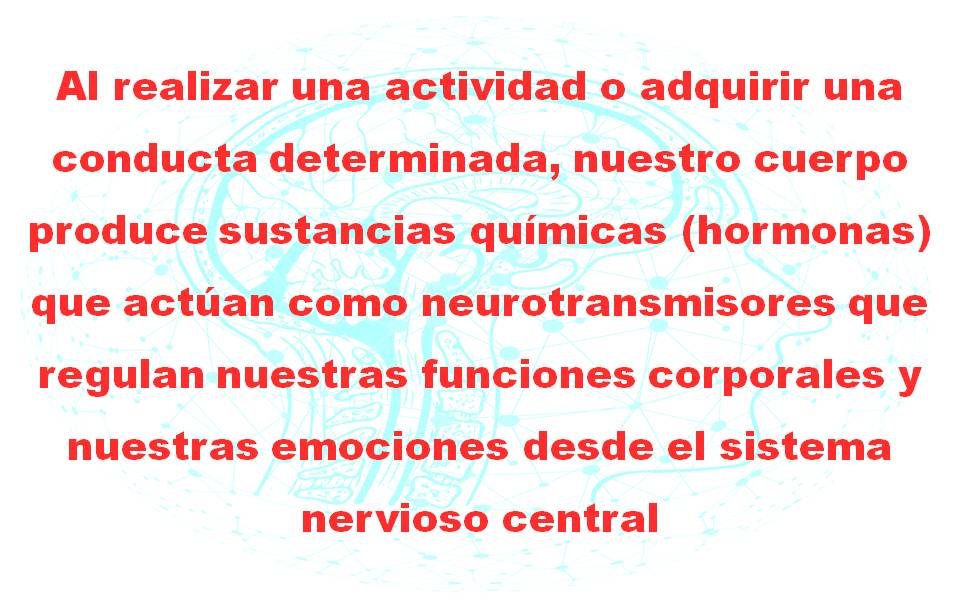
Así, por ejemplo:
La serotonina se relaciona con el sentimiento de felicidad, a la vez que cumple un papel de gran importancia en el proceso digestivo y en la regulación del ciclo de sueño (los niveles bajos de serotonina están biológicamente asociados con la depresión).
La dopamina es la hormona que produce las sensaciones de placer y también regula la memoria y los procesos cognitivos de aprendizaje y resolución de problemas.
La adrenalina nos mantiene alertas y sensibles a otros estímulos, actúa como un mecanismo de supervivencia y además regula el ritmo de la respiración y la presión arterial.
El glutamato es un importante procesador de información motora, sensorial, cognitiva y emocional.
Y estos son sólo algunos de los muchos tipos de neurotransmisores que insiden en el funcionamiento de nuestro cuerpo y mente.
Ahora armemos el rompecabezas...
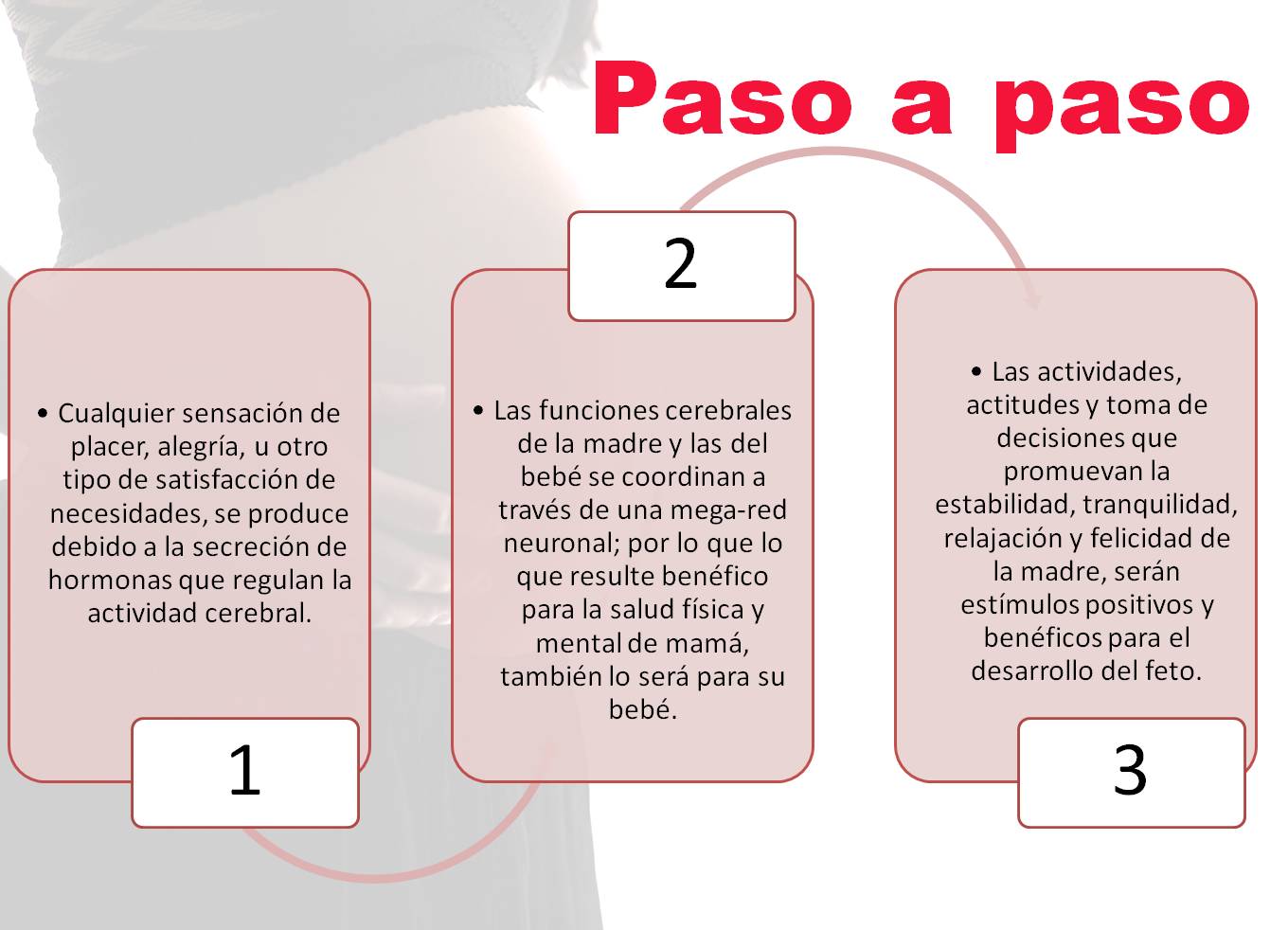
Ahora esta mucho más claro ¿verdad? 😃
¡Vamos a la práctica!
💓
Antes de apuntarnos a los ejercicios, es importante tener en cuenta y practicar estos principios durante todo el embarazo:
1) Acepta tus emociones:
Practicar la aceptación de nuestras emociones es un punto clave no sólo en el embarazo, debería considerarse un principio de vida, pero hemos aprendido erróneamente que ciertos sentimientos y/o emociones son "malos" y que debemos negarnos a sentirlos. La irá, la rabia, la tristeza y el miedo son algunos; pero reprimir nuestras emociones es contraproducente para los mecanismos con los que trabaja nuestra psique.
¿Les suena la frase: "no llores, que le hace daño al bebé"?
Pues contener y no drenar nuestra frustración tampoco es que sea muy bueno para él/ella; y si a eso le sumamos lo culpables que nos sentimos por "dañar" a nuestro hijo por tener estos sentimientos, tenemos la combinación perfecta para activar el estrés y la ansiedad, que sí pueden ser perjudiciales para el desarrollo.
Entonces, mantente conectada conscientemente con tu cuerpo y sus sensaciones, con tus emociones y sentimientos; vívelos, y date tiempo y espacio para reconocer en qué situaciónes te es útil sentirlas y en qué situaciones no. Así podrás trabajar en ello sin culpa.
2) Dedica tiempo a tus intereses:
Todo lo que te emocione, te apasione, te de paz o te empodere, merece tu tiempo, dáselo. Aquí podría enumerar una lista de cosas para hacer (rodearte de naturaleza, seguir trabajando, salir con amigas, emprender un proyecto...), pero son tantas las posibilidades que cada una debe crear su propia lista de intereses, llevarla acabo y rodear a nuestro bebé de esa energía que nos mueve y nos motiva.
3) Relaciónate con otras mujeres:
El apoyo y la comprensión que recibirás de otras madres, amigas y mujeres de tu familia no se parece a ningún otro, ellas serán tu espejo y refugio. Crea tu red de apoyo femenino y practica la sororidad.
¡Gracias por leerme!
Me pareció un artículo genial!
Me alegra que lo hayas que lo disfrutaras. Gracias por leer ♥
Tremendo articulo, justo necesitaba esta información ya que mi esposa esta embarazada y tenia pendiente en investigarla, gracias :)
Lo mejor de compartir material es que a otros pueda serles de utilidad. Gracias ♥
Otra cosita, deberías compartirla directamente en motherhood, seria mejor para tu post y para ti :), créeme vale la pena
Your post has been curated by us! Received 20.00% upvote from @opb. Do consider delegate to us to help support our project.
Do join our discord channel to give us feedback, https://discord.gg/bwb2ENt
* This bot is upvoting based on the criteria : 1. Not plagiarised, 2. Persistent previous quality posts, 3. Active engagement with other usersDo upvote this commment if you 💚 our service :)